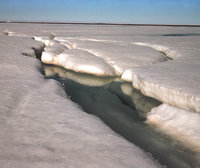Recent moves by Russia, Norway and even China have put a spotlight on the High North, where warming temperatures have led to greater seasonal ice melt and access. With increased future activity in the Arctic inevitable, the United States must begin to address some of the potential security challenges that could result. As part of this effort, the European Command (EUCOM) -- the U.S. military command responsible for the Arctic -- must leverage the progress made by the Arctic Council in nonsecurity matters to facilitate expanded security cooperation efforts in the region. The Arctic Council has successfully raised awareness of environmental and development issues in the region, especially by including representatives of indigenous Arctic populations in efforts to address them. However, the lack of a dedicated forum to discuss the interrelation of military, security and other issues in the Arctic means EUCOM is left to work outside the framework of the Arctic Council to ensure security in the region.
Due to the vast distances involved and the harsh operating environment, it is difficult for any one state to comprehensively monitor the Arctic situation or address all of its needs unilaterally. The disaster that struck the Russian submarine Kursk in 2000 and last year’s cruise-ship grounding off the Canadian coast serve as reminders of the challenges facing operations in the Arctic. As is the case in other extreme locations, the U.S. military’s expeditionary posture often means that grey-hulled ships and aircraft are the first to respond to a crisis, whether it is military in nature or not.
The 2010 Quadrennial Defense Review identified some of the challenges the U.S. must overcome in order to effectively conduct larger-scale and more-frequent operations in the Arctic. The Arctic presents technical and environmental problems for maintaining communications and GPS on the scale required to operate more than one or two ships at a time. EUCOM must also overcome shortcomings in maritime domain awareness and SAR assets as well as insufficient environmental-monitoring and forecasting capabilities to support even the most basic needs of the joint force if it is to step up operations in the Arctic. In short, EUCOM should focus on improving awareness of the Arctic operating environment, building a joint operational experience base and developing search-and-rescue (SAR) capabilities.

